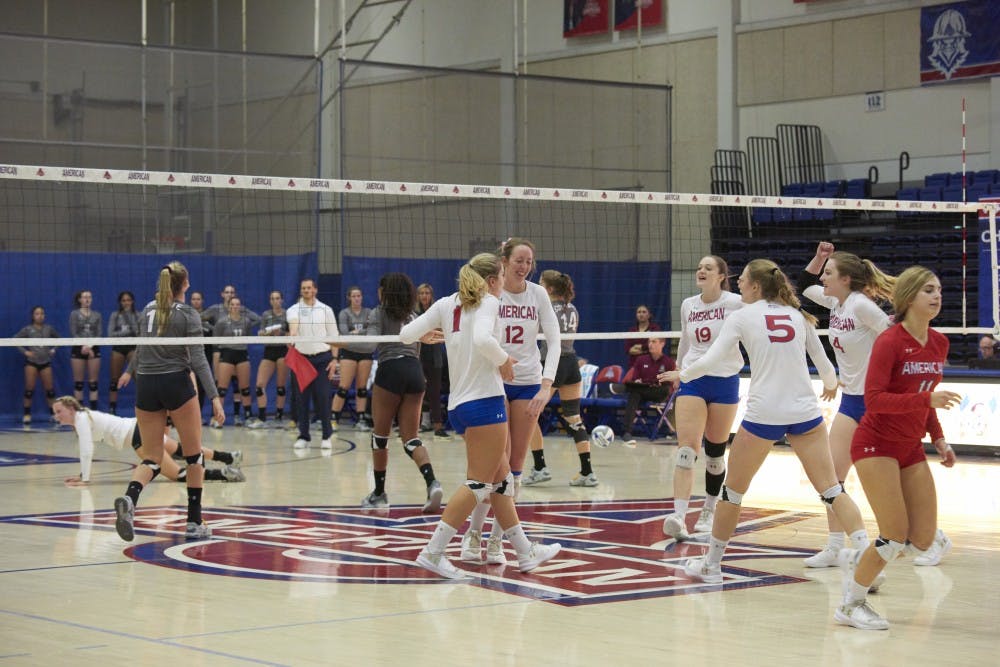When senior volleyball setter Kennedy Etheridge arrived at AU in 2015, she encountered typical challenges that any incoming freshman athlete faces, including adjusting to the team atmosphere and a busy schedule.
In addition, Etheridge was far from home. Growing up in Overland Park, Kansas, Etheridge originally wanted her college to be close to her parents so they could come to her games. Members of her family attend University of Missouri, the University of Kansas and Kansas State, and she hoped to join them.
“AU is against everything I initially wanted in a school,” Etheridge said. “I wanted a big-name school, big conference like SEC, Big 12, Pac-12.”
Once she came to AU, Etheridge faced another challenge: adjusting to AU’s liberal political culture. Etheridge’s upbringing has shaped her political views and she is conservative with views similar to those of President Donald Trump, she said.
“That’s probably been one of the hardest things to adjust to here,” Etheridge said “I stand behind my views to the nines.”
Etheridge said her home life influenced her views, and both her parents and grandparents are conservative and pro-Trump. She knew that coming to AU meant that her views were going to criticized because they were unpopular, and it has shaped her academic experience substantially.
“Going here has certainly been difficult when it comes to school and classes because everyone is liberal, everyone shares that view, and then there’s me who’s just alienated,” Etheridge said.
Etheridge said she isn’t opposed to changing her mind and said she has been willing to listen to other opinions. She has, for example, changed her views on gay marriage since arriving at the University.
“Before I came here, I was [anti] gay marriage and then I got here and matured in general over time,” Etheridge said. “Being here has made me less strict on my beliefs, I’m willing to listen to people more.”
As Etheridge’s own teammates learned more about her, they didn’t shy away from her different opinions. Instead, they embraced them and wanted to understand her views more. Their discussions didn’t create animosity in the locker room, and they allowed everyone’s opinions to be respected, Etheridge said. She did say she has debated with some girls on the team.
Their discussions touch on topics outside of politics that spark even more intense debate.
“One time on a bus trip, we had a two-hour debate about whether cheerleading should be considered a sport. It’s heated because our team is super competitive, but it’s healthy,” Etheridge said.
While her teammates are more accepting of her views, her classmates haven’t been as accepting, Etheridge said.
“When Trump was elected … there were riots on campus, someone burned someone with a ‘Make America Great Again’ hat,” Etheridge said. “I was scared, I actually got my life threatened in one of my classes last year. The past two years have been rough.”
She’s felt similarly about professors, too, describing one incident in which a professor gave her a negative look when she shared that she watched the presidential debates to support Trump.
“There have been a few classes where I’ve had to email professors because we spent three hours hating on Trump and I’m not here to do that, even if it was hating on Hillary Clinton, that’s a waste of a class period for me,” Etheridge said.
She strongly feels that protesting events happening in the country shouldn’t affect actions taken during the playing of the national anthem at sporting events. Her vocal support of America’s military and armed forces influences this view wholeheartedly, she said.
“People who disrespect the president, disrespect the country. If the president wants to commend you for winning a championship, that’s nothing about politics, that’s the president awarding you for your service,” Etheridge said.
Still, Etheridge has seen the potential for civil discourse through discussions with her teammates about political issues.
“It’s healthy, we all respect each other, we are all closer,” Etheridge said. “It’s easier to respect each other’s opinions when we’ve known each other and know where the person is coming from.”
This article originally appeared in The Eagle's November 2018 fall print edition.





